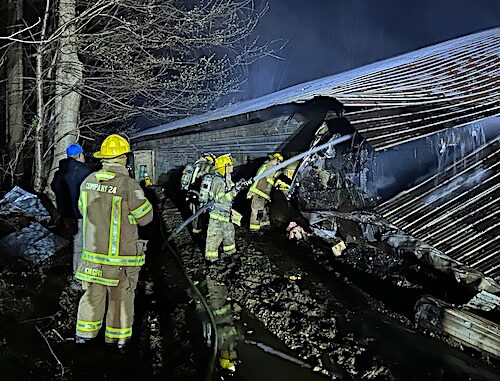
~ PVN staff report
LURAY, March 28 — Following a report of an early morning poultry house fire in Pine Grove on Monday, Page Valley News was contacted the following day by the Animal Welfare Institute based in Washington, D.C.
“Thanks for covering the Page County poultry house fire Monday that killed 15,500 chickens,” reads an email statement. “The Animal Welfare Institute (AWI) tracks barn fires nationwide and this fire is the second-most devastating barn fire in the country (in terms of animal deaths) so far this year.”
The organization stated that “nearly 6.5 million farm animals have perished in barn fires since 2013,” according to an AWI analysis.
“These devastating numbers, which likely do not even represent the full scale of the problem, serve as an urgent reminder to the industry to prioritize fire safety and prevention on farms,” the AWI statement reads. “No federal laws in the United States specifically protect farm animals from barn fires, and only a few states have adopted the National Fire Protection Association’s Fire and Life Safety in Animal Housing Facilities Code, which establishes safety requirements for animals in barns and other types of housing.”
Monday’s 4 a.m. fire started “in the area where the gas enters the building,” according to Stanley Fire Chief Terry A. Pettit. The exact cause is still unknown.
The 42’ x 400’ building on Pine Grove Farm was on fire when volunteers arrived, and the blaze was spreading toward both ends of the poultry house. Firefighters were able to contain the fire to that area and get it under control within 30 minutes.
The poultry house at 3660 Pine Grove Road, about four miles southeast of Stanley, is owned by Garry Cubbage, who grows for Shenandoah Valley Organics. The building was insured, and no injuries were reported. Together with the 15,500 chickens lost, total damages are estimated at $500,000.
“It is simply irresponsible that the poultry industry continues to ignore the risks that come with cramming hundreds of thousands of birds into tight quarters on these massive operations,” said Allie Granger, policy associate for AWI’s farm animal program.
“Under these conditions, emergency situations become death sentences, and it is hard to imagine anything worse than being burned alive,” Granger continued. “We hope the industry will remain focused on this issue and strongly encourage farms to adopt commonsense fire safety measures.”
Learn more about the Animal Welfare Institute at
•••
RELATED ARTICLES
Poultry house fire consumes 15,500 birds and causes $500K in estimated damages



Be the first to comment